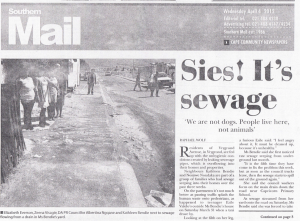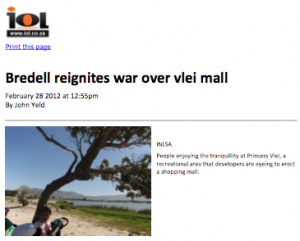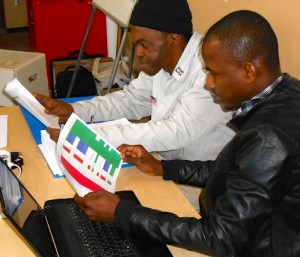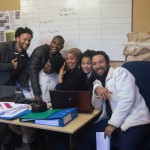Recently our MOVE project concluded a major research phase in the Cape Town Civic Network Study about citizen associations, the urban environment and local democracy. With our diverse and multi-lingual field-work team at the Sustainable Livelihoods Foundation, we interviewed 120 civil society organizations. Results will be developed in the year to come and work will be done to organize a larger meeting with civic associations in October/November 2014. There results will be debated and discussions held around alliances and civic networks.
One of the largest studies
The urban environment is often on the front pages of South African newspapers. And perhaps even more so in Cape Town. If struggles to access electricity, sewage and water capture headlines one week, it is baboons, fynbos and ‘alien’ invasive plants another; or the struggle to protect recreational space at Princess Vlei, or food security at the Philippi Horticulture Area. The matters of concern vary greatly. The urban environment is both ‘green’, ‘red’ and ‘brown’—and highly contested.
The Cape Town Civic Network Study (CT-CIVNET) has engaged organizations across a wide spectra—from ‘big’ to ‘small’, from the wealthy areas to the poor. Between March and July 2013 the CT-CIVNET field work team interviewed 120 citizen associations, both well-known—like the Treatment Action Campaign, Social Justice Coalition, Anti-Eviction Campaign, and Black Sash— and those perhaps ‘lesser known’ that work in neighborhoods like New World Foundation, Princess Vlei Forum, and Zandvlei Trust. Also Soil For Life and Abalimi was interviewed, amongst many others.
Internationally, and in South Africa, we lack studies that interview across a broad range of organizations, but this seems necessary to understand the pressures under which local democracies work and are practiced. The Cape Town Civic Network Study is set up to contribute to an area of research that strives to understand the role of citizen collective action and local democracy in postapartheid and postcolonial cities of the global south. The study is probably one of the largest interview-based urban social network studies undertaken in South Africa and Sub-Saharan Africa.
‘Web of relations’ in focus
The study will help to shed light on the role of civil society in a postapartheid city. A central aim is to better understand how the ‘web of relations’ that civics build over time—the civic networks of longer-lasting alliances—themselves come to form a back bone from which to take action and place new topics on the city’s agenda. But also how this seems to create a certain autonomy for civil society in relation to the state and private actors. Another aim is to better understand how the collaborations between state and civil society is played out, and how well public participation processes are perceived to be working.
Questions are also included on what events associations have actively participated in over time, what green and public spaces they care for (e.g. through planting) and mobilize around to protect, and their ties to civil servants. Based on this an analysis can be created that can increase the understanding of the role that civil society plays in shaping urban environments and how channels for local democratic participation is utilized.
Next steps—analysis and organizing a larger meeting
Currently the data includes 120 surveys, 80 individual level surveys as well as photographs and a local media archive of urban environmental articles stretching five years back. In the coming months this data will be worked with but later also followed-up by further in-depth interviews.
Building on the study, the team will organize a larger meeting or conference at the African Centre for Cities in October or November 2014. Here researchers’ results will be debated and generate a broader discussion and learning on how to build effective civic alliances. This meeting will also allow opportunity for dialogue, networking and further deliberations among various citizens’ organizations.
In the coming years the study will work to generate results that can be debated between and among researchers and citizen associations and other actors including the local government and civil servants. The hope is to contribute to the wider societal discussions about local democracy in Cape Town and cities of the global south more generally.
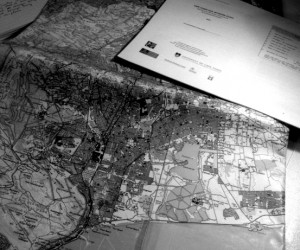
Local neighborhood groups have been interviewed in the area that stretch from Grassy Park to Tokai. Additionally also those groups active on the scale of the city.
Field work team—students & experienced researchers
The field work team consisted of social science students from the University of Western Cape and the University of Cape Town, together with Dr. Henrik Ernstson and Mr. Rory Liedeman. The students brought different languages and backgrounds and their own knowledge of the city of Cape Town. The hard-working field work team included: Nabeel Petersen (UWC), Nceba Mangesi (UWC), Jessica Rattle (UCT), Karin Nandoo (UWC), Coralie Valentyn (UWC), and Adam Adanti (UWC).
Funding and contacts
The study is coordinated and carried out by the African Centre for Cities at the University of Cape Town with Sustainable Livelihoods Foundation as core partner. Key partner is also Professor Mario Diani from Trento University, Italy, and Dr. Lorien Jasny at UC Davis, USA. The study is funded by the Swedish research funder Formas.
——-
Lead investigator is Dr Henrik Ernstson, African Centre for Cities, University of Cape Town & Department of History, Stanford University. He has recently also joined the KTH Environmental Humanities at KTH Institute of Technology. Email: henrik.ernstson@uct.ac.za
Contact person at the Sustainable Livelihood Foundation is Mr. Rory Liedeman.
